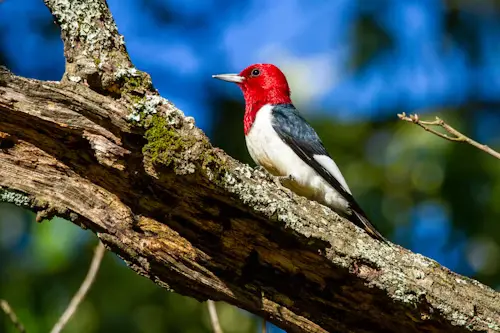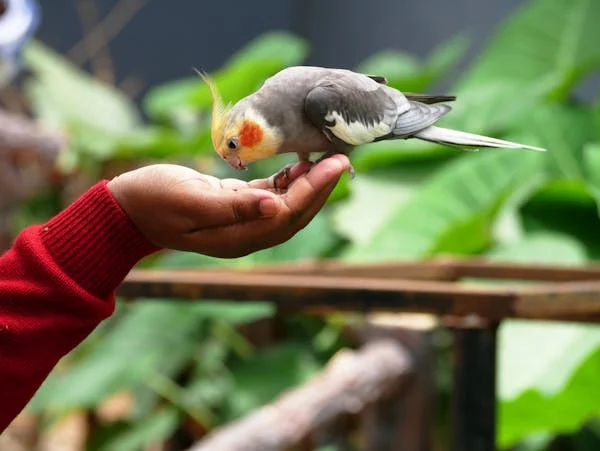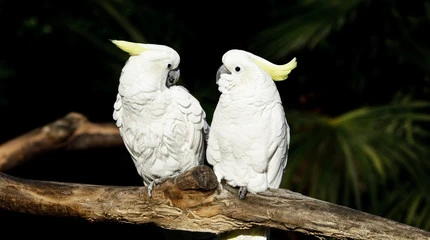Rare Budgie Bird Facts: How to Spot Best Unique Types
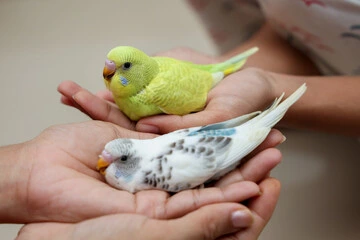
Imagine staring into your budgie’s cage and realizing you’ve brought home a living, breathing masterpiece—one that leaves every visitor speechless. That’s the magic of a rare budgie bird. Beyond the familiar blues and greens lie feathery unicorns: birds cloaked in charcoal shadows, wings dusted with cinnamon, or faces dipped in midnight ink. If you’ve ever wondered what transforms an everyday pet into a jaw-dropping marvel, you’re about to uncover the secrets of genetics that breeders whisper about.
Table of Contents
What Makes a Budgie “Rare”?
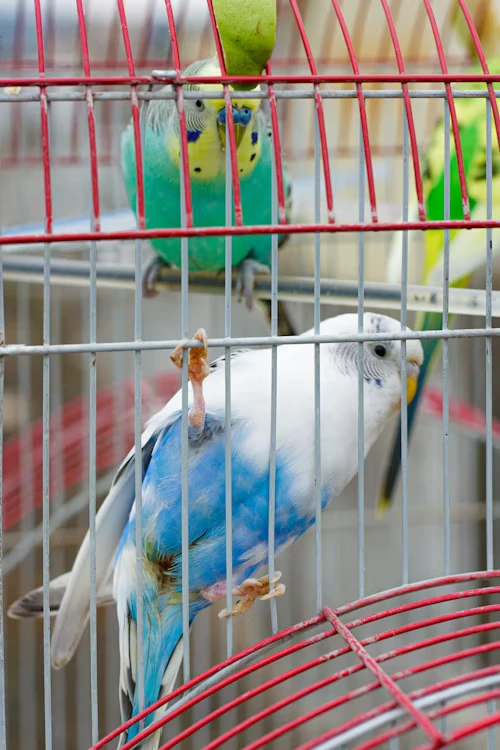
Picture budgie mutations like a painter’s palette. Common varieties blend base colors like yellow or blue with predictable patterns. But when recessive genes collide or spontaneous glitches occur, magic happens. Rarity hinges on three pillars:
- Genetic complexity: Needing 4–6 gene pairs aligning perfectly.
- Breeding challenges: Low chick survival rates in high-strain mutations.
- Global scarcity: Only 0.1% of captive budgies qualify as truly rare.
Meet the Holy Grail of Budgies: 6 Jaw-Dropping Rare Varieties
1. Anthracite: The Shadow Ghost
Imagine a budgie carved from volcanic rock. Anthracites boast uniformly charcoal-gray feathers, emerging when homozygous dark factor genes saturate blue-based bodies.
Why it’s rare: Breeding requires two anthracite parents—scarcer than blue moons.
Visual ID:
| Trait | Anthracite | Normal Gray |
|---|---|---|
| Body Color | Deep charcoal | Light-to-medium gray |
| Cheek Patches | Bright white | Purple or blue |
| Tail Feathers | Near-black | Paler gray |
2. Blackface Budgie: The Enigmatic Phantom
This nocturnal beauty flips the script: instead of vibrant cheek patches, its entire face masks in solid black, while its body screams bold yellow—or blue. It’s wildly misunderstood; many mislabel dark factor budgies as blackface types when genuine ones need specific gene pairings.
Critical note: True blackface mutations dominate ancestors of pet birds today, making authentic ones museum-worthy finds.
3. Brownwing Budgie: Earth’s Gentle Brushstroke
Cinnamon wings meet pastel bodies in this whisper-soft variety. Unlike albinos or lacewings, brownwings retain warm earth tones across flight feathers while keeping delicate markings. Their mutation dilutes melanin to create sepia-toned wings. Rant alert: many misidentify fallow budgies as brownwings!
4. Slate: The Ice Queen
Cool, uniform gray-blue defines this stunner. Slates spark bewilderment—their bluish tint vs anthracite’s ash tone makes them elusive. True Scottish slate budgies are practically extinct in captive populations.
5. Texas Clearbody: The Crown Jewel
Imagine a cobalt blue budgie with wings like stained glass! Clearbodies emerge from recessive combinations that restrict pigment entirely. You’ll see vibrant bodies paired with translucent wings that refract light. Few breeders globally can produce them.
6. Crested: Feathered Royalty
Born with luscious head plumes, crested budgies look permanently windswept. So cherished that a crested pair recently sold for £850 ($1,180)—nearly 20x pandemic pricing. But caution: improper breeding causes severe skin issues, shrinking populations.
Beyond Aesthetics: What It Means to Own Ultra-Rare Budgies
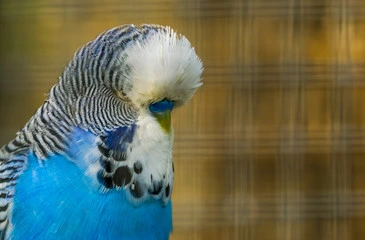
Price Tags That Sting
Whereas common budgies cost $25–$50, rarities escalate sharply:
- Anthracites: $300–$800.
- Authentic crested: $700+.
- Blackface mutations start at $280+.
Darker Flipside:
Demand fuels unethical dyeing scams targeting less experienced buyers. False claims of “rare pink budgies”—scientifically impossible without red pigment genes—circulate on social media. You can protect yourself by using authentic references like this rare budgie mutations breakdown to identify genuine breeds.
Specialized Care Needs
Many budgie mutations have undisclosed health pitfalls:
- Feather dust buildup in crested budgies needing weekly baths.
- Heightened seizure risks in high-pigment varieties (anthracite, blackface).
Commit to regular check-ups and nutrient-dense diets. You can track lifespan optimization strategies here for sensitive breeds.
Finding Ethical Breeders: Avoid Fraud and Harm
Sad but true: mystique attracts exploiters. You’ll encounter sellers pushing:
- Dyed budgies falsely marketed as “Ruby Red” exclusives.
- “Fanning” mutations by pairing closely related birds. Such genetic corner-cutting leads to shortened lives or deformities.
Ethical Buying Checklist:
✅ Use trusted breeder communities like the budgie subreddit’s rare color guide.
✅ Demand hatch certificate details for parent lineages.
✅ Scan for ethical breeding practices. Look for partnerships with certified veterinary hubs.
✅ Avoid birds categorized as ‘rare’ at chain pet stores. True rarities emerge through dedicated small-scale or hobbyist breeders.
Myth-Busting: Debunking Rare Budgie Bird Buzzwords
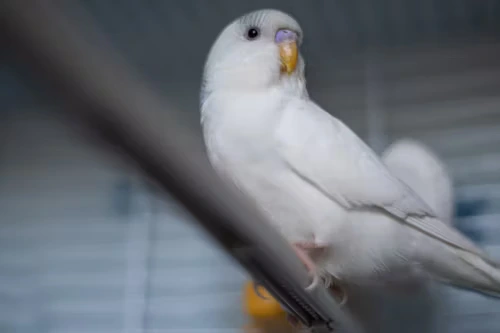
Myth 1: “Pink budgies exist!”
Fact: Decades of genetic studies confirm impossible—budgies lack Psittacine red pigmentation. Any pink-tinted images result from photo manipulation.
Myth 2: “Rare = exotic appearance = less socialization.”
Fact: Personalities don’t inherit via feather genetics! Training uncommon budgies requires patience. Discover how to decode their vocalizations here.
Myth 3: “Wild-caught rare budgies adapt quickly.”
Fact: Capturing wild variants harms fragile ecosystems and kills birds through stress. Most survive just three days post-capture.
What’s Next for Rare Budgies? Conservation Captive Breeding
Responsible enthusiasts practice conservation genetics:
- Maintain studbooks to prevent inbreeding.
- Pair mutations globally via breeder collaborations.
- Support repopulation efforts in native Australian grasslands—where habitat loss endangers wild color morphs.
Frequently Asked Questions
1. Can rare budgies like blackface types live with normal budgies?
Absolutely! They share identical care needs but establish flocks gradually. Rarer birds stress easily—supervise all interactions.
2. Where do I find trustworthy breeders for brownwing or crested budgies?
Australia dominates ethical networks through groups like ANBC (Avicultural Society of NSW). If you’re outside AU, collaborate via verified registries.
3. Are purple budgies real?
Only via photo filters—no natural purple pigmentation exists. What’s labeled purple is deep violet blue series budgies under bright lighting.
4. Why shouldn’t I breed my rare budgies impulsively?
First, determine their exact mutation—mislabeled pairs yield disappointing offspring. Second, females under 1 year risk fatal egg-binding. You should master basics with resources like our budgie care guide first.
A Truth More Stunning Than Rare Feathers
Chasing rare budgie birds tests your patience and integrity. But holding a genuine slate budgie bred ethically? That’s breathtaking. Remember: their allure lies not just in scarcity but in the machines securing their survival—knowledgeable, compassionate guardians like you. Whatever budgie graces your life, its worth comes from the songs sung at your window and head-bobbing greetings when you return home.
Craving More?
Who’s your feathered marvel? Share its story below! Or dive deeper into birder secrets about global species. Questions on unusual budgie quirks? Let’s solve them together—drop a comment!


